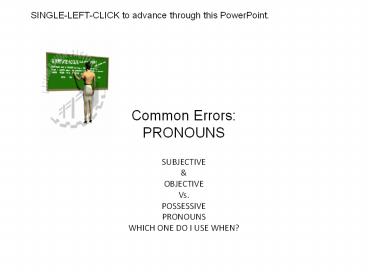Common Errors: PRONOUNS - PowerPoint PPT Presentation
Title:
Common Errors: PRONOUNS
Description:
SINGLE-LEFT-CLICK to advance through this PowerPoint. Common Errors: PRONOUNS SUBJECTIVE & OBJECTIVE Vs. POSSESSIVE PRONOUNS WHICH ONE DO I USE WHEN? – PowerPoint PPT presentation
Number of Views:286
Avg rating:3.0/5.0
Title: Common Errors: PRONOUNS
1
Common Errors PRONOUNS
SINGLE-LEFT-CLICK to advance through this
PowerPoint.
- SUBJECTIVE
- OBJECTIVE
- Vs.
- POSSESSIVE
- PRONOUNS
- WHICH ONE DO I USE WHEN?
2
Pronoun Case
- There are three cases
- 1. Subjective case
- pronouns used as subject.2. Objective case
- pronouns used as objects of verbs or
prepositions.3. Possessive case - pronouns which express ownership.
3
SUBJECTS, OBJECTS,POSSESSIVE
- Pronouns as SUBJECTS
- I, you, she, he, it, we you, they, who
- Pronouns as OBJECTS
- Me, you, him, her. it, us, you, them, whom
- Pronouns that show POSSESSION
- My, mine, your, yours, his, her, hers, it, its,
our, ours, their, theirs, whose
4
RULE
- Correct pronoun case requires
- different forms of personal pronouns for
- different jobs in sentences.
5
Some problems of case
- 1. In compound structures, where there are two
pronouns or a noun and a pronoun, drop the other
noun for a moment. - Then you can see which case you want.
- INCORRECT Bob and me travel a good deal.(Would
you say, "me travel"?) - CORRECT
- Bob and I travel a good deal.(Also, note the use
third person plural pronoun and verb (travel) - In other words
- They travel a good deal.
6
Comparisons
- Comparisons usually follow than or as
- He is taller than I (not me) (He is taller than I
am tall). - This helps you as much as me.
- (This helps you as much as it helps me.)
- She is as noisy as I (She is as noisy as I am).
- Comparisons are really shorthand
- they omit implied words, usually verbs.
7
In formal and semiformal writing
- Use the subjective form after a form of the verb
to be.FORMAL It is I. - INFORMAL It is me.
- Use whom in the objective case.FORMAL To whom
am I talking? - INFORMAL Who am I talking to?
Use FORMAL language in ACADEMIC writing!
8
Faulty Pronoun Reference
- Do not fall into the trap of using
- objective case pronouns
- when
- subject pronouns are needed.
- Examples
9
PERSONAL PRONOUNS WITH NOUN SUBJECTS
- You must also remember to use
- subjective case pronouns
- when a pronoun is used along with a noun subject.
- Example (CORRECT)
10
Personal Pronouns as Subjective Complements
- Finally, you must use a subjective case pronoun
when the pronoun functions as a subjective
complement. - What is a subjective complement?
- A subjective complement answers the question who
or what after a form of the verb to be. - A subjective complement completes the subject.
- Or, in other words, a subjective complement
- means the same as the subject but follows the
verb. - Example
11
In a subject (noun) complement
- Use a subjective case pronoun.
- EXAMPLE
(CORRECT)
Do NOT say
12
Pronouns with verbals
- A verbal is a verb form doing the job of a noun
or adjective. - Two kinds of verbals used with pronouns
- gerunds and participles.
- 1 GERUND Gerunds end in ing and act like
nouns.
NOTE OBJECTS are nouns or subjective case
pronouns.
13
Gerundsand POSSESSIVE CASE PRONOUNS
- When nouns or pronouns precede gerunds in
sentences, - USE THE POSSESSIVE CASE!
14
Sometimes
- Sentences
- can
- be
- more
- complicated
15
(No Transcript)
16
- For more study with self-check exercises
- http//www.towson.edu/ows/ModuleCASE.htm
17
TWENTY MOST COMMON WRITING ERRORS
- At the link below, you'll see a list. To the
left of each item is a number. Click on the
number to see explanations. http//www.bedfordstma
rtins.com/nsmhandbook/errors.html
18
DEADLY SINS IN WRITING
- PowerPoints Self-check exercises
- http//grammar.ccc.commnet.edu/GRAMMAR/sins.htm
19
REMINDER
- Document all studies
- in your
- STUDY JOURNAL!
20
Thank you
- for your scholarship!































